Is it possible to treat gynecomastia without surgery? For many men, enlarged breast tissue—whether from hormones, weight gain, genetics, or medications—can be distressing. While surgery is a common solution, natural approaches like diet, exercise, and hormone regulation may help in some cases. But do they work? Let’s examine the options, their effectiveness, and when surgery might still be needed.
Understanding Gynecomastia
Gynecomastia usually occurs when the balance of estrogen and testosterone in the body is disturbed. Increased estrogen levels, reduced testosterone levels, or both can lead to excess breast tissue. Sometimes the cause is clear, such as a medication side effect, but often there may be multiple contributing factors. While this condition does not usually pose serious health risks, it can significantly affect self-esteem and body image.
Before attempting any natural approach, it is essential to determine what’s causing your gynecomastia. Consulting with a qualified medical professional provides insight into whether your condition is primarily related to hormonal imbalances, lifestyle factors, or other underlying health concerns.
Natural Approaches & Their Effectiveness
Many wonder whether diet changes, exercise routines, or other non-invasive methods can effectively reduce or eliminate gynecomastia. While these approaches may help some men—particularly those whose enlarged breast tissue contains higher amounts of fat—true glandular gynecomastia often does not fully resolve without surgery.
However, non-surgical interventions can still be beneficial. They may lessen the overall appearance, improve chest contour, and support better health. It’s also common for physicians to recommend trying certain natural strategies before considering surgical options, especially for patients whose weight or lifestyle might be a contributing factor.
Lifestyle Changes: Diet & Exercise
A balanced diet rich in lean proteins, whole grains, healthy fats, and plenty of fruits and vegetables is a key step. Cutting back on processed foods and added sugars can help reduce overall body fat, which in turn might reduce the fatty component of enlarged breasts. Though dietary changes may not eliminate gynecomastia outright, maintaining a healthy weight can reduce its prominence.
Effects of Exercise
Strength training aimed at the chest, arms, and back can help sculpt the upper body. Exercises like push-ups, bench presses, and rows build muscle mass, potentially improving chest definition. Cardio workouts—running, swimming, or cycling—are also vital for fat loss and overall health.
Limitations
Even a disciplined approach to diet and exercise may not fully resolve gynecomastia caused by hormonal imbalances or significant glandular tissue. While these lifestyle changes are fundamental for wellness, they can’t always address deeper physiological issues.
Hormonal Factors & Medical Management
In some cases, hormonal imbalances cause or worsen gynecomastia. A healthcare provider may assess hormone levels—testosterone, estrogen, and others—to determine if prescription medication, hormone therapy, or discontinuation of certain drugs could help. If the condition is tied to a specific medication, switching to an alternative can be highly effective in preventing further breast enlargement.
Despite these medical interventions, full reversal is not guaranteed unless excess tissue is removed. Hormone therapy may curb progression, but many patients still have residual tissue requiring surgical evaluation.
When To Consider Surgery
If lifestyle modifications and medical management do not sufficiently reduce gynecomastia, or if your quality of life remains impacted, surgical intervention is often the most definitive solution. Modern surgical techniques—such as liposuction, gland excision, or a combination of both—offer a targeted approach, removing excess tissue and reshaping the chest for a more masculine contour.
Explore Your Best Options with Dr. Sessa
Whether seeking non-surgical routes or pursuing a surgical procedure, an experienced surgeon’s guidance remains important. At Sarasota Surgical Arts, we believe in exploring every viable option—beginning with understanding each patient’s medical history, current lifestyle, and specific goals. If surgery becomes the appropriate choice, our team will guide you through each step, ensuring you feel supported, well-informed, and prepared.
Schedule a consultation with Dr. Alberico Sessa at Sarasota Surgical Arts to explore your options and determine the most effective path toward a more confident you. Call us at (941) 923-1736 or visit us online.






